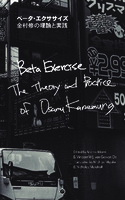Beta Exercise: The Theory and Practice of Osamu Kanemura
Author(s)
Kanemura, Osamu
Contributor(s)
Mazzi, Marco (editor)
Gerven Oei, Vincent W.J. van (editor)
Collection
ScholarLedLanguage
English; JapaneseAbstract
Beta Exercise: The Theory and Practice of Osamu Kanemura is the first bilingual (Japanese-English) book to provide an overview of the theoretical work of Japanese photographer and video artist Osamu Kanemura, a unique voice in the world of contemporary photography. The opening essay “Life Is a Gift” comments on the transformation of human life into an exchangeable commodity and the abstraction it entails. “Essay 01” develops Kanemura’s idea of photographic “technique” in an era when such techniques have become accessible to all, radically undermining the importance of human subjectivity in the process of capturing the photographic image: “We can say that modern technology constitutes photographic technique.” Instead, Kanemura argues, extra-technical elements such as concept and vision will have to compensate for the expression of individuality that technique is no longer able to convey. Taking cues from Kiyoshi Kurosawa and Karlheinz Stockhausen, the essay “Dead-Stick Landing” develops Kanemura’s theory of the moving image as mechanical system, solely governed by an “on-off switch.” “Essay 02” develops these ideas into a consideration of cinematic time and the experience of boredom in cinema as the result of a truthful “loyalty” expressed to machines, and not to stories. The essays are accompanied by an extensive two-part interview with Italian photographer Marco Mazzi, touching upon topics ranging from the technical aspects of his equipment, the concept of non-editing, and the destruction of the frame to the similarity between Mao’s dialectics and the camera, the presence of the human figure as trace, and the politics of photographing Tokyo.
Keywords
photography; media studies; Osamu Kanemura; Japan; aestheticsDOI
10.21983/P3.0241.1.00ISBN
9781947477776, 9781947447783OCN
1100504833Publisher
punctum booksPublisher website
https://punctumbooks.com/Publication date and place
Brooklyn, NY, 2019Classification
Individual photographers


 Download
Download